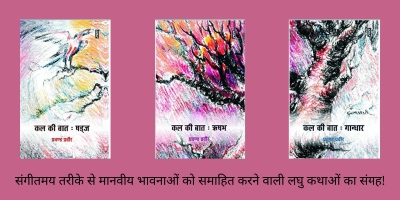By Vishnu Makhijani New Delhi 21 November : .Academia is a negative influence on contemporary Hindi literature.
There are no universal or timeless topics such as empathy and moral dilemmas.Prachand Praveer is a well-known New Age author who inspired many young writers.
He has recently published “Kal Ki Baat”, a magnum opus that he calls “a cry in an hypocritical world”.
I believe that Hindi academia has negatively affected contemporary Hindi literature.
To appease academic trends at universities, criticism has become more important than the responsibility for society.
The current literature discourse is predominated by topical issues like poverty and gender studies.Literature has become a weak follower of the political discourse.” Praveer has a Bachelor’s in Chemical Engineering at IIT Delhi and is currently employed by a Gurugram-based risk management company.
We are not able to discuss universal, timeless topics such as empathy and moral dilemmas, metaphysics or poetic merits.He added that all literary masterpieces are products of their time and place.
However, these issues are often embedded within them and can lead to a profound universal truth.
Praveer stated that the dominance of Hindi academia over the critical discourse has caused a “sharp divide” among young Hindi writers.
This first group is made up of Hindi traditional writers, who write for literary journals with a very narrow reach within society.Modern bohemian writers inspired by English pulp fiction make up the second group.
They have adjusted the environment to Indian culture, but they still treat books as consumable goods and are focused on expanding the market.He maintained that neither of the two organizations has had much success reaching Hindi-speaking people.
Is Hindi able to keep its purity, or is it being corrupted by Bollywood’s influence?
Let us acknowledge the fact that languages are dynamic by nature.What we now call Hindi and good Hindi was not possible 200 years ago.The advent of mass media has made it possible to infuse our everyday language with many foreign words.Hindi verbs have now been replaced by English verbs.This is very frustrating for linguists.Let me explain.
It is possible to infuse nouns with foreign languages.But, breaking the rules of grammar corrupts the language.It renders it unintelligible and incoherent.This corruption leads to one abandoning the mother tongue, and choosing to speak in another language with the same rules of grammar and communication,” he explained.
Praveer said that Hindi society was to blame for not only the love they continue to show for Hindi language.
He said that “there is no credible authority to discuss the corruption of Hindi in mass communication media like TV news channels, leading newspapers” and added that he has called this an “intentional assault on Indian culture” in Makar.
This short story forms part of his collection “Uttarayan”.
I believe Hindi has been deliberately and consciously degraded by Hindi academics and the consumerists.
Writers should produce timeless classics in order to preserve the language.Praveer explained, “Alas, Hindi writers are losing this fight for the past thirty years.”
How did “Kal Ki Baat” come to be?
Kal Ki Baat can be described as a cry for help in an hypocritical world.The fourteen-year-old collection of stories is a compilation of shorter stories that could be fit on one page.
These stories were written primarily for friends and coworkers who don’t speak Hindi, but do not wish to be restricted by their native language.Many familiar stories were rewritten and I shared them with my friends.
Some took an interest while others did not.Praveer stated that those who were interested aren’t avid readers, but rather prefer shorter narratives.Praveer encouraged Praveer to keep the series going.
He said that Kal Ki Baat was a deliberate effort “to bring back Hindi readers universal human concerns, which evade both time and place.” These humorous stories reflect on everyday life and aim to reach out to readers and raise awareness about the world and ourselves.
The first volume of “Shadi” sets the tone for the series’ diversity and offers a glimpse into the future.
This episode contains 44 stories, out of 99 episodes.They mainly deal with children, encounters with pretty girls, and end with a demoralizing investigation into the Greek idea of happiness.
The second volume of “Rishabh” focuses primarily on the workplace and the children in the neighbourhood.The behaviour of humans has been characterized by many characteristics – the theme is still resonant in this volume which discusses both astrology as well as truth.
The third volume of “Gandhar” focuses more on social behavior, including those who travel with others, the cinema-goers, the poor, the negotiation of marriages, Hindi literature circles, and the moral aspects that are part our daily lives.Vishnu Khare is also remembered fondly, referring to works by Krishna Kalpit and Mangalesh Dbral, contemporary Hindi poets.
Next? Is there a next project in his future?
I am currently working on stories that are based upon the thirteen principal Upanishads.Five stories based on the principal Upanishads have been published in respected journals like ‘Samalochan, Tadbhav, and Pahal.They may take several years.They have long been revered in India as the source for all types of Indian philosophical thought.
Their poetic language makes it difficult for people to comprehend, but also allows room for modern interpretations.
Praveer said, “In addition to that, I recently became involved in translating world poems into Hindi with an able colleague.”
(Vishnu Makhijani can be reached at vishnu.makhijani@ians.in)
vm/sks/ksk/ #Academia #sharp #young #Hindi #writers #IANS #Delhi #Bollywood
.







